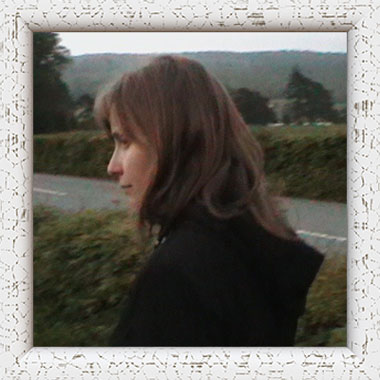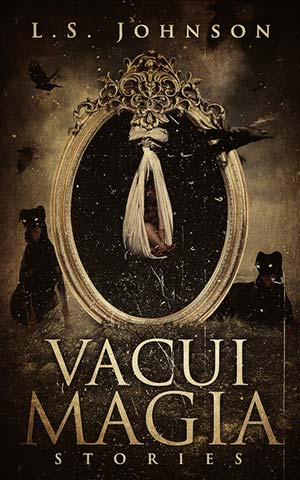Joining me today, minus her four cats, is weird fiction and fantasy author, L.S. Johnson. Thank you, L.S., for taking the time to chat to me. Please sit down, get comfortable and let’s begin.

About L.S. Johnson
L.S. Johnson’s stories have appeared or are forthcoming in Strange Horizons, Interzone, Long Hidden, and Year’s Best Weird Fiction Vol. 3. Her first collection, Vacui Magia: Stories, is now available. Currently she’s working on a fantasy trilogy set in 18th century Europe.
What book brings you here today?
Vacui Magia: Stories
Tell us a bit about your book
L.S. Johnson delivers a provocative and original short story collection that ingeniously blends myth and nightmare. Whether it concerns the efforts of an infertile witch to construct a golem-baby, or a daughter’s quest to understand a father’s guilt and a mother’s supernatural infidelities, or a woman’s violent association with a group of possibly imaginary but nonetheless dangerous little men, each story in this remarkable collection demonstrates the limitless capacity of intelligent speculative fiction to enthrall, inspire, and amaze.

Have you always liked to write?
A better question is, do I actually like to write? And I’m not sure that I do. I like bits of it, but it’s real work, at least for me. If I don’t write, however, I stop sleeping. A teacher once told me there are people who choose to express themselves in words, and then there are people who think in words. Neither one is more of a Writer than the other, but the latter folks often struggle to not write. I think I fall in that camp: I think in words, I see my thoughts as sentences. Even when I’m imagining a scene I’m imagining it both as a kind of immersive cinematic moment and as sentences and paragraphs. It can be exhausting—so exhausting I’ve quit writing three times now—but I’ve given up fighting it. Nosce te ipsum?
What writing advice do you have for aspiring authors?
Keep your eyes on your desk. It’s very, very easy to get caught up in comparisons, especially in writing where individual career paths are often presented as “advice.” Comparisons only take up time and creative energy; they’re never, ever useful.
How long does it usually take you to write the first draft of a book?
Years? The last one took years.
What are you working on now?
I’ve been working on a trilogy for about, oh, five years now. Foolishly I followed my heart and wrote book 2 before book 1, so I made the process much more difficult than it needed to be.
Can you give us a few tasty morsels from your work-in-progress?
Seissan tied on his stock and flicked his collar down with a practiced hand, smoothing it into place. Though he stood before a mirror, he was not watching his hands but rather studying his face, a melancholy habit of late. He told himself it was the mirror which provoked it—it was a new, smooth glass, one of a set sent by Gemma with the last tithe, the cow persisted in dumping her wares upon them—and it had a sharpness of reflection that was shocking. It seemed to Seissan that he had never seen himself so clearly before; it was a cold reminder that his old face was lost to him forever, the stuff of a few fogged memories of lakes and puddles, polished metal and filthy glass. What had he looked like, before Malcolm came for him? Had his hairless pate been so smooth, had his jowls hung lower? There had been bumps in his cheeks, he would feel them when he shaved, yet now he couldn’t quite place where they had been. Like trying to recall the map of a lost continent.
His eyes, at least, were the same black pools they had always been. A fragile peg that he had hung his reason on more than once. No matter what had been wrought upon his person, he could look into his own eyes after and think, I am still Seissan.
Behind him the mold lay upon the wooden table, lit by the candelabra as if it were some holy object. Pandora’s box, more like. Seissan thought to open it, but instead untied and retied his stock, twitched free an imagined wrinkle in his collar. He had dug out a small recess when he first made the mold, an indentation right on the seam, to make it easier to prise the halves open again. Now the shadowed divot seemed to watch him, though whether to remonstrate or encourage him he could not say.
He checked his wig, took his time drawing on his coat. He was Seissan; he would always be Seissan.
There were moments when the whole of one’s life would pivot, like a ship wrenching itself about: this was one of those moments, he knew. He savored the sickening nausea, the damp sweat that misted his underarms. It was almost like being a man again.
What had his face looked like, before Malcolm came that night and wrenched him from everything he knew?
Describe what your ideal writing space looks like.
An adjustable desk so I can sit/stand as needed; a big window with a pleasant scene; a tea kettle; someplace close to the desk for the cats to sit; some kind of old couch that I can read/edit on.
What’s the strangest thing you have ever had to research for your book?
How long a penis would stay erect after the man’s neck was broken. And now I have to answer at least one more question so I don’t end on that image. 😉
Why did you choose to write in your genre? If you write in more than one, how do you balance them?
Speculative fiction lets you articulate a lot of internal things in interesting ways. Literary fiction can often feel like you’re sitting in on a therapy session. It can be done well, don’t get me wrong, but I find even a touch of weirdness can make you see a situation with fresh eyes. Think of something like The Wind-Up Bird Chronicle, which is as much about a struggling marriage and family secrets as it is about cats and wells and a woman named Nutmeg.
How long have you been writing?
I wrote my first story in elementary school. In high school I took creative writing, won a prize, and earned a comment on my report card along the lines of, “you should write every day.” I ignored this advice for the next thirty years. (Last year I reached out to that teacher just to let her say, “I told you so.” )
What advice would you give to your younger self?
Write more, you fool, and finish what you write.
When you’re writing, do you listen to music or do you need silence?
Everything I write has a soundtrack. Tying stories to music not only helps shape the language, it gives me a quick way to get back into a story after not working on it for a while.
What do you find most challenging about writing?
Everything. Writing is work—fulfilling work, but work nonetheless.
Where can readers go to discover more about you and your books?
Website | Facebook | Twitter | Amazon Author Page | Goodreads
Available formats: ebook and paperback
1



Be the first to comment!